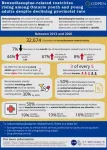The wolf’s comeback in Europe has preoccupied people all across the continent over the last years. Where is it? What is its range? What does it live on? The only way to get solid answers to these questions is through GPS tracking. In December, it was a cause for celebration when a GPS collar was fitted onto a wolf for the first time in Denmark. Only three months later, the signal stopped.
GPS trackers that stop working or run out of power prematurely are a frequent problem and source of frustration among researchers who want to track mammals for longer periods, says biologist and postdoc Rasmus W. Havmøller of the University of Copenhagen. Typically, batteries are the problem:
"When studying wildlife with GPS technology, the biggest limitation is always going to be the battery. It's enormously frustrating. It is not uncommon that one gets to track an animal for a few months at most before the GPS device goes dead. But tracking an animal for a longer period of time is often important, as in the case with wolves here in Denmark. Therefore, we need a more reliable power source," says Rasmus W. Havmøller and continues:
"Solar cells work fine for birds, but solar cells are so fragile that mammals tend to crush them. Moreover, many mammals are nocturnal. So we needed to come up with an alternative. I had long thought about the cleverness of the automatic wristwatches that many of us wear, which harvest energy from our own body's movements."
Together with research colleagues at UCPH, the Max Planck Institute of Animal Behavior and DTU, Havmøller developed a battery-free GPS wildlife tracker that runs on kinetic energy – i.e., the energy generated when an animal moves. The scientific article on the research has been published in the journal PLOS ONE.
Lasts a lifetime, at a tenth of the cost
"It sure as heck works! The more an animal moves, the more energy it generates and the more GPS location messages it sends. Unless the equipment itself breaks, it will work throughout an animal's lifetime. At the same time, it only weighs 150 grams – significantly less than most other GPS trackers – so it can even be fitted onto small mammals," says Havmøller, adding that the device costs less than a tenth of traditional GPS collars, which run up to €3,500-4,000 apiece.
Rasmus W. Havmøller and his colleague, lead author Troels Gregersen, are assembling the GPS trackers themselves in a small laboratory at the Natural History Museum of Denmark.
The device, dubbed "KineFox" by the researchers, has been fitted onto one of the Danish Nature Agency's wild horses and has been sending data on the horse's position for the past six months. The tracker has also been tested on dogs and a bison. The plan is for it to be long-term tested on several animal species.
Ideal for rewilding of animals
Rewilding is one area that the researchers envision the GPS tracker making a difference. The lack of supervision of animals released into the wild is a problem that has given rise to heated debate in recent years.
"The systematic human supervision of wild horses and cattle, to keep them from starving for example, is extremely resource intensive. Our tracker is ready to address this task," says Rasmus W. Havmøller.
Because the tracking unit contains an accelerometer that measures how an animal moves, wildlife managers can get a glimpse of an animal’s condition through its activity pattern.
"Studies with cows and pigs show that they begin moving differently when ill. In this way, it is likely that the tracker will also be able to tell something about an animal’s health. This means that you can comply with supervision legislation without having to get people out there every single day to find and inspect animals," says the researcher.
Can help us protect endangered species
Havmøller points out that Kinefox can also lend a hand to endangered species, wherever knowledge about the way they live and move about is lacking:
"There is no good alternative to this GPS device when it comes to serious long-term studies and studies of how animal species disperse. Because either the equipment is too big, too heavy or too fragile. But it’s really important to understand how a species moves from one place to another, and where they are shot or poisoned, for example – not least if we want to protect them better."
He himself has been frustrated by GPS devices whose batteries died suddenly while studying both endangered leopards and wild dogs:
"There are endangered species where we know incredibly little about what they do for most of their lives. These include tigers, which can travel thousands of kilometers, as well the Asiatic wild dogs and leopards that I’m involved with. When wild dogs reach sexual maturity, leave their mother and set out on their own, they are very vulnerable. But from that moment on, we know nothing about what they’re up to and why some die while others make it. It is a black box. I hope that this invention can remedy that," concludes Rasmus W. Havmøller.
Havmøller and his research colleagues are now in contact with several potential stakeholders about the long-term testing of Kinefox on various animal species.
FACT BOX: HOW "KINEFOX" WORKS
Instead of a battery, "Kinefox'' has a so-called capacitor, which stores the energy that the device harvests through an animal’s movements.
Data from Kinefox is transmitted over Sigfox, a wireless network that is widespread around the world.
Whereas a traditional GPS wildlife tracker typically costs €3,500-4,000, the new transmitter costs around €270 in materials.
The researchers have opted to use an open source design for Kinefox, making the information available to all.
FACT BOX: ABOUT THE RESEARCH
The researchers behind "Kinefox" are Troels Gregersen, Peter Rask Møller, Linnea Worsøe Havmøller and Rasmus Worsøe Havmøller of the University of Copenhagen’s Natural History Museum of Denmark; Timm A. Wild and Martin Wikelski of the Max Planck Institute of Animal Behavior, Germany; and Torben Anker Lenau from DTU Engineering Design and Product Development.
The scientific research article has been published in the journal PLOS ONE.
The research project is funded by the Villum Foundation under the Villum Experiment programme.
END


